Introduction
Quantum technology has been gaining increasing attention, especially after the United Nations declared 2025 as the International Year of Quantum Science and Technology.1/ This initiative aims to raise awareness of the potential applications of quantum technology. The most discussed quantum technology is quantum computing, which allows computers to process large amounts of data in a fraction of a second. In the future, as this technology becomes more widely adopted, industries including the banking sector are expected to reap significant benefits. These include faster and more accurate financial data analysis, along with the development of groundbreaking innovations.
While quantum computing promises to revolutionize processing capabilities in unprecedented ways, the widespread application of this technology still faces significant challenges, such as understanding quantum principles and developing skilled workforces. The banking sector must therefore begin planning to leverage quantum computing, similar to artificial intelligence (AI) technology has made a transformative impact over the past one to two years.
What is Quantum Computing, and How Will It Revolutionize Computing?
Understanding Quantum Technology
To understand quantum computing, we should begin by exploring the concept of "quantum," which is a branch of physics. Quantum science studies phenomena at the atomic scale,2/ where objects exhibit behaviors or properties governed by physical laws that are unfamiliar to human intuition. For instance, an atom can exist in multiple places simultaneously, pass through barriers, interact with each other despite being separated by vast distances.
Quantum knowledge can be developed and applied to create technologies that impact both daily life and business. For example, transistors,3/ which are essential components within the Central Processing Unit (CPU) of smartphones and computers, and MRI scanners,4/ which are utilized in medical applications, both leverage quantum principles. In the future, quantum principles could significantly enhance the efficiency of technologies that are deeply integrated into our everyday lives.
There are three main types of quantum technology applications, namely (1) Quantum Sensing, such as quantum navigation systems that can measure motion with greater precision than current GPS systems. (2) Quantum communication, which applies quantum principles to enhance communication5/ making data encryption more secure. In 2024, the UK government allocated funding for research and development in this new communication method, recognizing its potential in public health data exchange and its ability to enhance AI technology.6/ (3) Quantum Computing, the most widely applied type of quantum technology. According to McKinsey, the market value of quantum computing is expected to reach $131 billion by 2040.7/
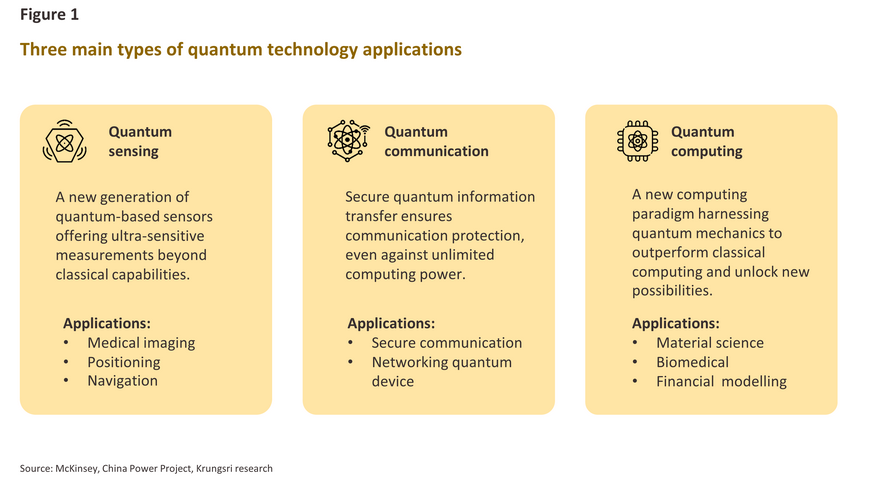
Differences Between Classical Computing and Quantum Computing
The key difference between classical computing and quantum computing lies in their fundamental processing and storage units. Classical computers, which are widely used in daily life, rely on classical computing principles, where the smallest unit of data storage and computation is the bit.8/ A bit can exist in only one of two possible states, 0 or 1, at any given time. Each bit operates independently, representing electrical signals within a computer circuit to indicate binary conditions (e.g., on-off, true-false). This enables classical computers to process data and execute instructions with precision.
In contrast, quantum computing leverages principles of quantum mechanics, such as quantum superposition9/ and quantum entanglement,10/ to develop a new fundamental unit of processing and data storage known as a "quantum bit" or "qubit." Unlike classical bits, a qubit can exist in a state of 0, 1, or both simultaneously. Moreover, qubits can interact and correlate their states with one another. Consequently, quantum computers, which operate based on quantum computing principles, are capable of processing or solving complex problems with remarkable speed.
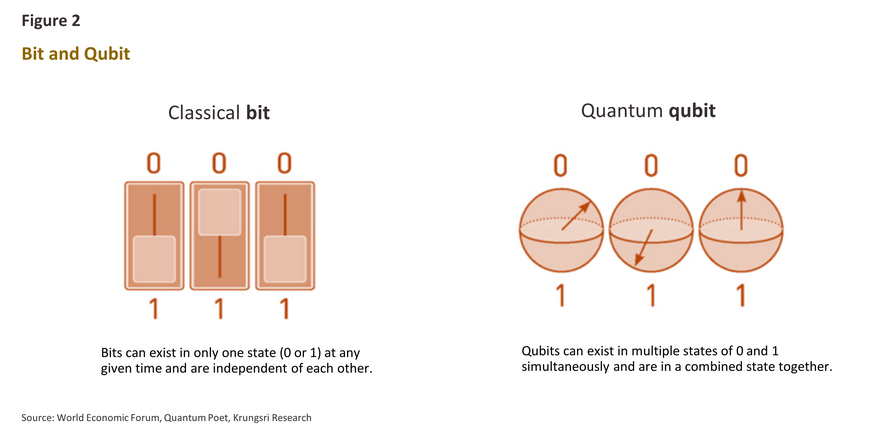
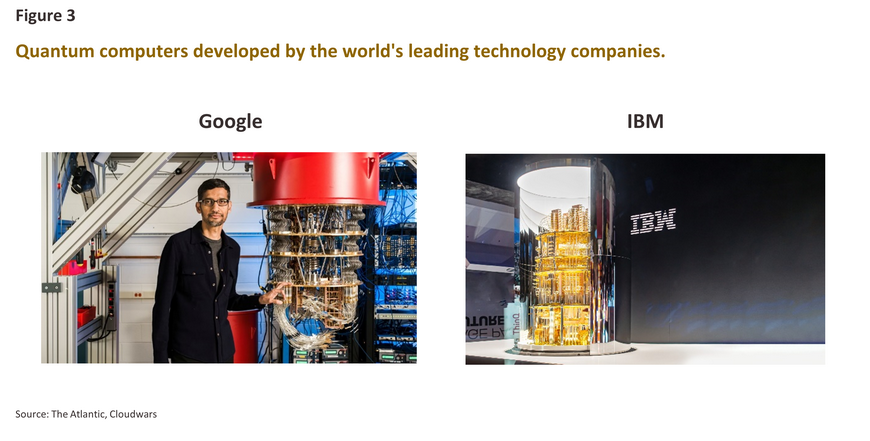
The Benefits of Quantum Computing
Quantum computing has distinct characteristics that set it apart from classical computing, as follows:
Accelerated Processing Speed
Quantum computers can process highly complex tasks significantly faster than classical computers. For instance, "Sycamore," a quantum computer developed by Google, can solve a complex problem in a fraction of a second. In contrast, "Frontier," a supercomputer11/ ranked as the second most powerful in the world,12/ a classical computer, would take 47 years to solve the same problem. This demonstrates that quantum computing has the potential to surpass the capabilities of classical computing in processing power.
Better Analysis of Big Data
Classical computing has limitations when processing massive amounts of data. As a result, only about 1% of global data is stored and can be utilized effectively. Frost & Sullivan (2024) predicts that by 2025, data from various sources such as customer behavior, healthcare, and supply chain management could reach 181 zettabytes (ZB), equivalent to 181 trillion terabytes (TB).14/ As data continues to grow in complexity and volume, quantum computing can help analyze and identify relationships between variables in large datasets quickly, unlocking the potential for further utilization and insights.
More Accurate Estimations
Classical computers may have an error margin of about 5%-20% when processing complex tasks such as optimization, simulation, or machine learning. However, BCG (2024) predicts that quantum computers will be able to provide more accurate calculations with lower error margins compared to classical computing.15/ Additionally, Kea et al. (2024) found that stock price predictions could be 10% more accurate when quantum computing is combined with classical computing.16/ Despite this potential, quantum computing may still face higher error rates due to quantum noise, which will be discussed further.
Enhancing AI Intelligence
Quantum computing accelerates AI’s ability to handle complex tasks and generates high-quality synthetic data for training generative AI (GenAI)18/ models and other types of AI, such as predictive AI.19/ This can significantly reduce both the cost and time required for AI model development, including large language models (LLMs)20/ that power GenAI, which rely on massive amounts of data for training.
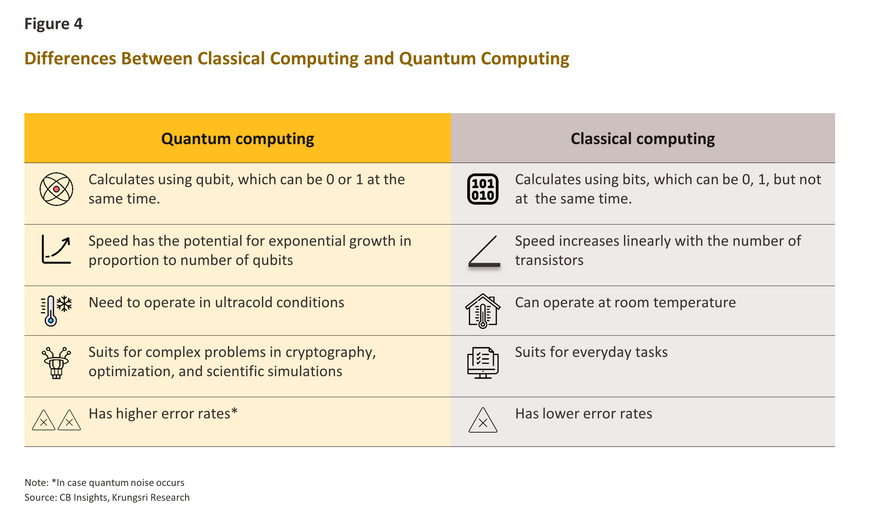
Limitations of Quantum Computing
Quantum noise, or interference in quantum systems, is a significant limitation in the application of quantum computers. This noise can result from temperature fluctuations, vibrations, or magnetic fields. Even slight disturbances can cause qubits to lose their quantum properties, leading to errors in quantum processing and reducing the system's ability to handle complex or large amounts of data. Therefore, quantum computers need to operate in environments that minimize quantum noise, such as maintaining temperatures near absolute zero. (−273.15°C).21/ The controlled environments for quantum computers may require spaces as large as a car to accommodate the necessary cooling and shielding systems.
Additionally, the development of quantum software and quantum algorithms to fully optimize quantum computer performance necessitates new programming languages.22/ Furthermore, the manufacturing process for quantum computers is significantly more complex than that of classical computers. These factors collectively pose substantial limitations to the widespread adoption and application of quantum computing.23/
Developments in Quantum Computing
In the past 1-2 years, major global tech companies have been rapidly advancing AI technologies alongside quantum computing innovations. For instance, Nvidia, a leading chip manufacturer, has collaborated with Google, leveraging Nvidia’s supercomputers to create models of quantum computing systems aimed at enhancing efficiency and addressing limitations in quantum processing.24/ Additionally, several other tech companies have been focusing on quantum error correction. IBM, for instance, has developed quantum error correction processes that are 10 times more efficient than before.25/ Meanwhile, Google has employed AI to analyze and pinpoint the causes of errors with greater precision.26/ In December 2024, Google unveiled its "Willow" quantum chip, which uses a new method of qubit interconnection to reduce errors even as the number of qubits increases.27/ This development is a key milestone in paving the way for practical applications of quantum computing, offering potential benefits across various fields.
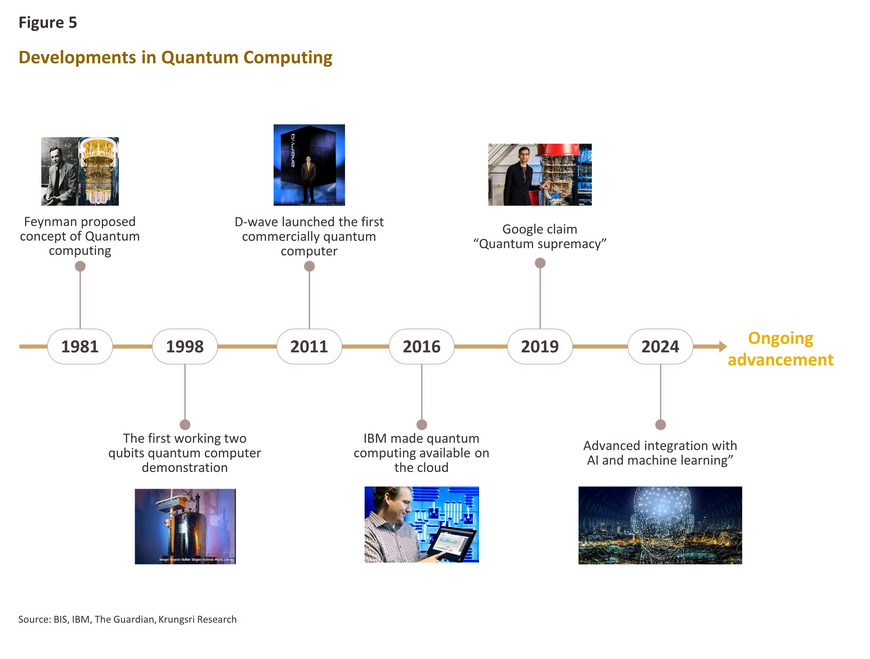
Businesses are beginning to plan and implement quantum computing in various areas. For example, Airbus is exploring the use of quantum computing in the design of aircraft, focusing on fluid dynamics28/ to enhance performance and support the sustainability goals of the aviation industry, such as developing fuel cells as a replacement for aviation fuel.29/ Meanwhile, in Thailand, Paypoint, a rewards management platform, has adopted quantum technology to calculate accumulated points among partners in real time.30/
The examples mentioned above are just a few applications of quantum computing that can be leveraged in business. In the future, quantum computing will play a significant role in driving innovation across various fields. For instance, it can be used to create complex chemical reaction models, which will be beneficial for pharmaceutical research and drug development. Additionally, it has the potential to design lightweight, fast-charging batteries for electric vehicles, extending their range per charge.31/
The application of quantum computing is gaining significant attention.
Currently, both the technology and business sectors are closely monitoring developments and projections related to the widespread adoption of quantum computing. A survey conducted by McKinsey in 2023 revealed that over 72% of technology executives, investors, and quantum computing experts anticipate that quantum computers will achieve full fault tolerance by 2035, while the remaining 28% believe this milestone will be reached after 2040.32/
It is anticipated that the demand for quantum computing will grow in the future, driven by the continuous advancements in this technology, while its limitations are progressively reduced. According to McKinsey (2024), the global market value of quantum computing is projected to reach 131 billion USD by 2040, a 14.6-fold increase from 9 billion USD in 2023.33/ This corresponds to a compound annual growth rate (CAGR) of 17%.
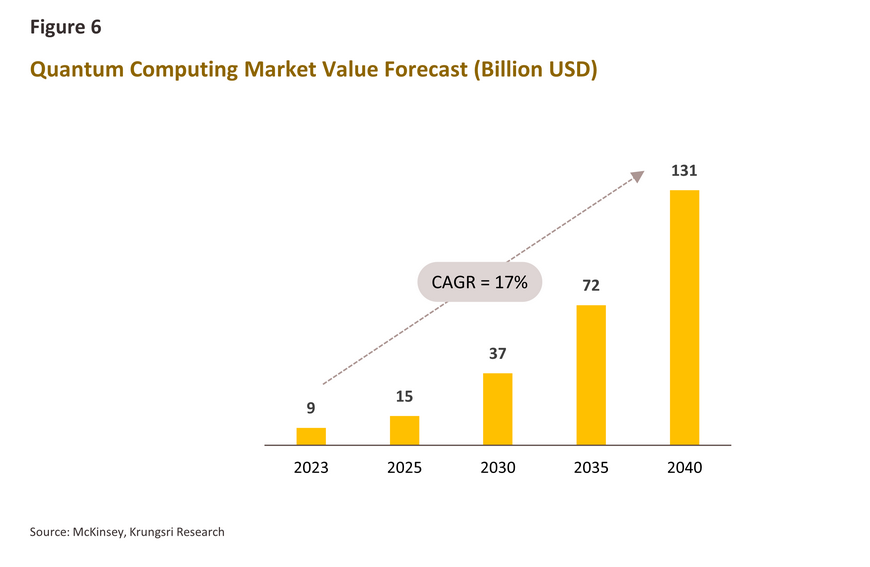
Despite the remarkable capabilities of quantum computers, they currently need to be used in conjunction with classical computers. For example, data must be prepared using classical computers before being processed by quantum computers, or classical computers are required to access quantum computing resources via cloud-connected quantum computing. Moreover, fundamental computing tasks that are widely familiar, such as browsing the internet through web browsers, writing or reading emails, and working with documents, still rely on classical computers.34/
How Can Banks Leverage Quantum Computing?
The financial sector is poised to be one of the key beneficiaries of quantum computing. According to McKinsey (2023), by 2035, quantum computing is projected to generate a global value of $622 million USD (approximately 20 billion THB) for the financial sector.35/ Notably, in corporate banking, quantum computing is expected to contribute up to $190 million (approximately 6.6 billion baht) (Figure 7). Moreover, the financial sector has shown increasing interest in investing in quantum computing. Deloitte (2023) estimates that by 2032, global financial institutions will spend approximately $19 billion on quantum computing investments, an increase of over 233 times compared to $80 million in 2022, representing a 72% compound annual growth rate (CAGR) (Figure 8).36/
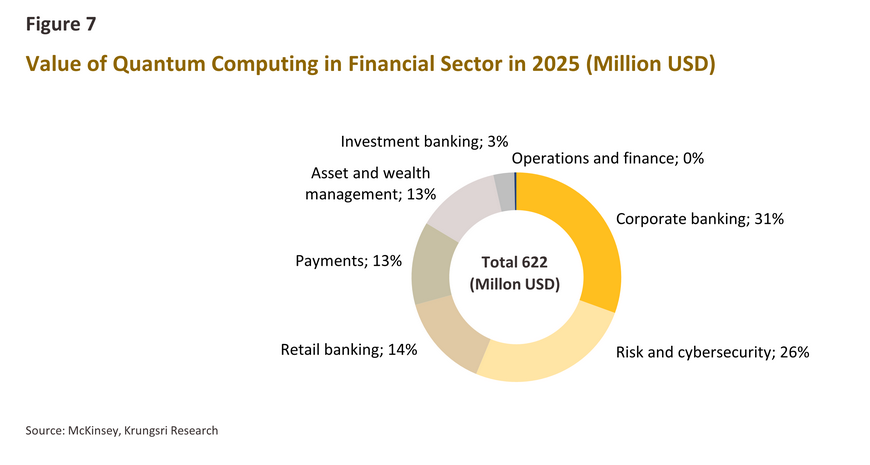
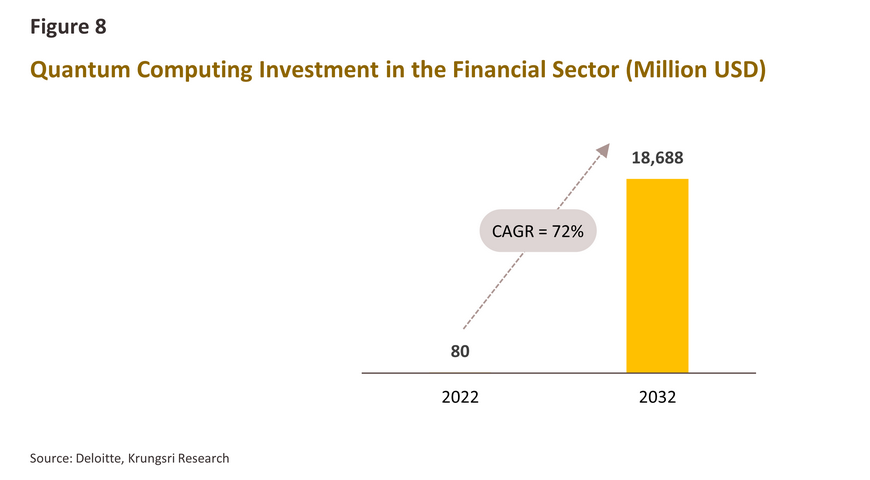
Quantum computing provides significant benefits to the banking industry across various applications, with the following notable examples of implementation.
Modelling and simulation
Quantum computing helps manage complex and large volumes of data or variables, enabling banks to make more accurate and faster predictions or models. Examples of quantum computing applications in banking include stress testing, liquidity forecasting, risk management, target customer segmentation, and branch expansion or ATM placement planning to align with customer density and demand in specific areas.
Portfolio optimization
Classical computers may require significant time to process portfolio management tasks due to the need to handle multiple data types. Quantum computing, however, serves as a powerful tool that enables banks to swiftly adjust the composition of investment portfolio such as stocks and bonds, to maximize returns while minimizing risk. Currently, leading financial institutions, such as Citi37/ and JPMorgan,38/ are exploring the use of quantum computing in this area by partnering with technology companies to enhance portfolio management efficiency.
Fraud detection
In the process of identifying abnormal or potentially fraudulent transactions, banks must process vast amounts of data, including behavioral patterns, transaction formats, and location details. Quantum computers facilitate the processing of both structured and unstructured data,39/ resulting in faster and more accurate detection of suspicious transactions.
Enhancing Customer Experience
Banks can integrate quantum computing with AI to elevate customer service by analyzing customer data and behavior to offer hyper-personalized financial products and services in real time.40/ As quantum computing enhances AI intelligence, banks can also develop smarter chatbots that respond to customer needs more efficiently and accurately, resulting in an improved customer experience.
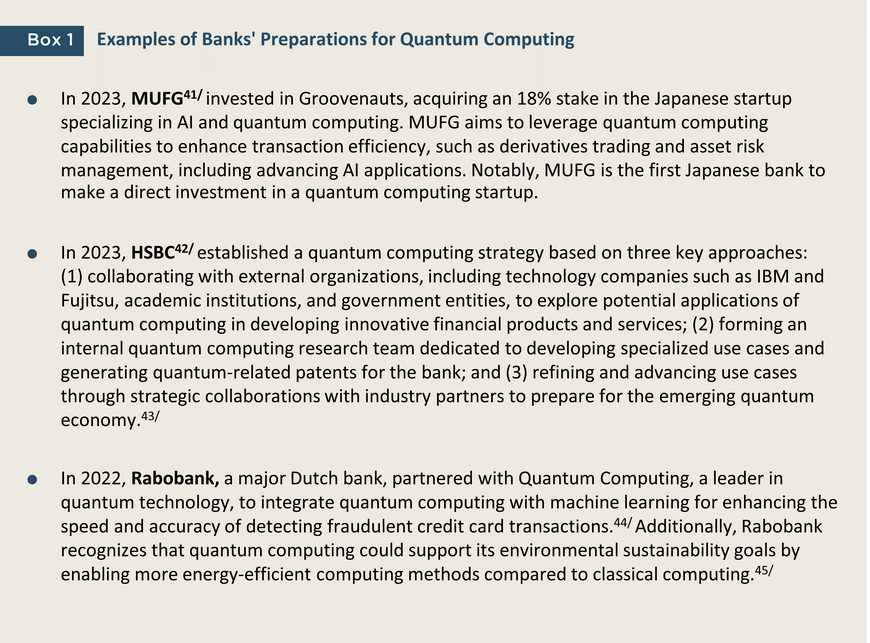
Challenges for the Banking Sector
Although it may take some time before quantum computing technology is fully ready for commercial use, banks and other financial institutions interested in this technology should prepare early to address the following challenges.
Budget
Quantum computing requires a substantial budget across multiple areas. Hardware costs are particularly high, with Frost & Sullivan (2024) estimating that a quantum computer with thousands of qubits could cost up to $15 million USD46/ (approximately 523 million THB). Software costs encompass specialized quantum computing applications and their integration with classical computing systems. Infrastructure and management systems also demand significant investment, as quantum computing requires an optimal operating environment, such as dilution refrigerators,47/ which may have an initial cost of around $500,000 USD (approximately 17.4 million THB).48/ Additionally, the cost of quantum computing specialists is expected to remain high due to the scarcity of skilled professionals in this emerging field.
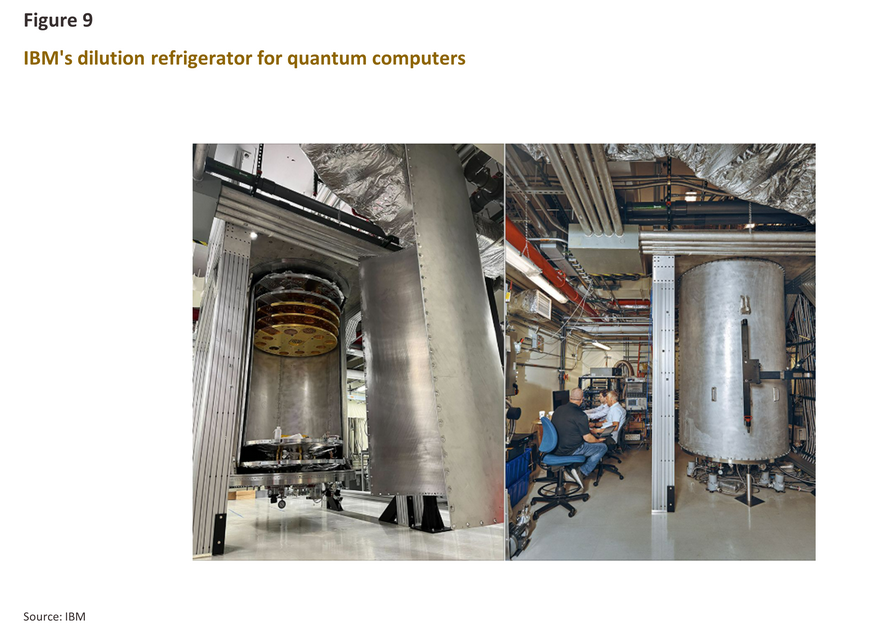
Workforce Development
The global shortage of quantum computing talent poses a significant challenge. McKinsey (2022) predicts that by 2025, the number of quantum professionals will be less than 50% of the available job openings.49/ To address this, banks must begin planning for dedicated quantum computing teams, encompassing both software and hardware development. Collaboration with academic institutions, research centers, and specialized startups is essential for talent development and knowledge exchange. As quantum computing remains an emerging technology, ongoing research and development efforts are crucial for identifying its optimal applications in the financial sector.
Cybersecurity Measures
Quantum computing could enable cybercriminals to accelerate cyberattacks, particularly in decrypting data, posing a threat to financial data security, banks must adopt preventive measures to counter quantum-driven cyber risks. For example, the U.S. National Institute of Standards and Technology (NIST) has introduced the world's first Post-Quantum Cryptography (PQC) standards to safeguard sensitive data in the quantum era.50/ Similarly, the Monetary Authority of Singapore (MAS) has issued guidelines on quantum-related cyber risks for financial institutions.51/ These initiatives highlight the growing global focus on cybersecurity preparedness as quantum computing advances across industries, including the financial sector.
Krungsri Research View
Quantum computing has the potential to become the new standard for computer processing in the near future. The financial sector should closely monitor both the advancements in this technology and its integration with AI, as this convergence could lead to significant technological breakthroughs.
Currently, experts in the technology field have differing opinions on the widespread application of quantum computing. For instance, Jensen Huang, CEO of Nvidia, a leading global chip manufacturer, believes that "quantum computers will not be truly operational for at least 15-20 more years.” whereas Alan Baratz, CEO of D-Wave,52/ asserts that “quantum computers are already applicable for business benefits.”53/ Additionally, Gartner has ranked Post-Quantum Cryptography (PQC) among the top 10 Strategic Technology Trends for 2025,54/ emphasizing the need for businesses to safeguard data and address quantum-driven cybersecurity threats. Although there is no clear consensus yet, banks should begin exploring potential use cases of quantum computing that align with their business strategies. They may start by initiating pilot projects to study the feasibility and investment returns, which will enable banks to fully capitalize on the technology when it becomes practically applicable.
While quantum computers will significantly enhance the efficiency of processing highly complex tasks, they are not expected to entirely replace classical computers. Quantum computers are particularly suited for specialized tasks, such as managing vast amounts of data, risk analysis, or even advancing AI capabilities. On the other hand, traditional computers will continue to excel in handling basic, everyday operations. Therefore, banks adopting quantum computing should prioritize developing systems or software to effectively integrate and coordinate operations between classical and quantum computers.
Moreover, while quantum computers are more energy-efficient than classical computers for complex, high-precision processing (Figure 10), potentially positioning quantum computing as 'green computing' that supports sustainability goals,55/ they consume significant electricity in cooling systems.56/ Thus, banks adopting this technology should focus on energy use within infrastructure systems designed to maintain optimal temperatures and environmental conditions.
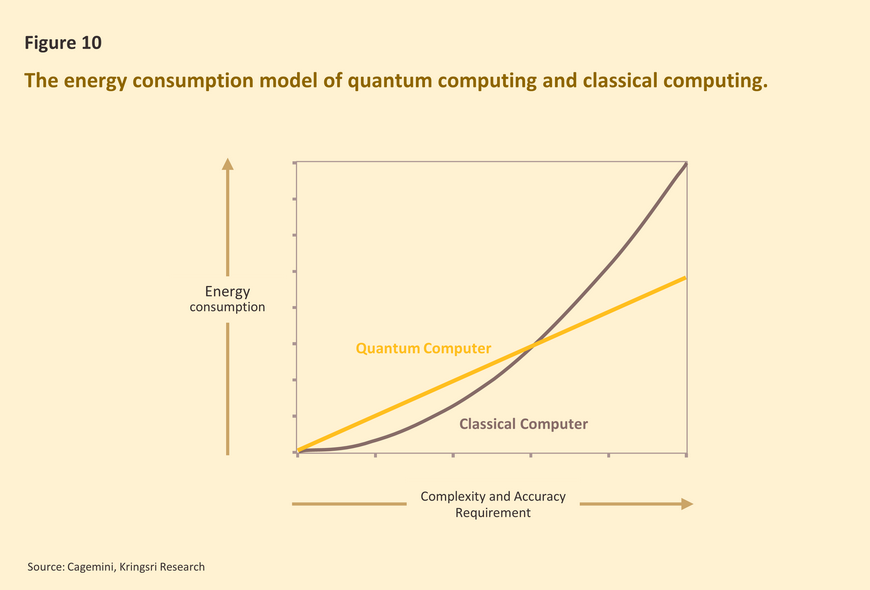
Ultimately, all sectors, including technology companies, financial institutions, and regulatory agencies, should raise awareness of cybersecurity risks associated with quantum technology by developing standards and practices to ensure robust data security.
References
BCG (2024): “The Long-Term Forecast for Quantum Computing Still Looks Bright” Retrieved December 17 2024 from https://www.bcg.com/publications/2024/long-term-forecast-for-quantum-computing-still-looks-bright
Berenice Baker (2024): “Airbus Looks to Quantum Computing for Decarbonization” Retrieved December 15 2024 from https://www.iotworldtoday.com/quantum/airbus-looks-to-quantum-computing-for-decarbonization
Capgemini (2023): “Green quantum computing” Retrieved 8 December from https://www.capgemini.com/insights/expert-perspectives/green-quantum-computing/
Deloitte (2023): “Industry spending on quantum computing will rise dramatically. Will it pay off?” Retrieved November 27 2024 from https://www2.deloitte.com/us/en/insights/industry/financial-services/financial-services-industry-predictions/2023/quantum-computing-in-finance.html
Department for Science, Innovation and Technology (2024): “Over £100 million boost to quantum hubs to develop life-saving blood tests and resilient security systems”. Retrieved December 9 2024 from https://www.gov.uk/government/news/over-100-million-boost-to-quantum-hubs-to-develop-life-saving-blood-tests-and-resilient-security-systems
Don Nico Forbes (2024): “Glass Chips Offer Hope of Cleaner Future for Quantum Computing” Retrieved November 30 2024 from https://www.wsj.com/articles/glass-chips-offer-hope-of-cleaner-future-for-quantum-computing-9c72a806?utm_source=chatgpt.com
Forst & Sullivan (2024): “Emerging Markets Quantum Computing Growth Opportunities” Retrieved December 23 2024 from https://store.frost.com/global-quantum-computing-growth-opportunities.html
Gene Alvarez (2024): “Gartner Top 10 Strategic Technology Trends for 2025” Retrieved January 21 2025 from https://www.gartner.com/en/articles/top-technology-trends-2025
HSBC (2023): “HSBC and Quantum” Retrieved 12 December from https://www.hsbc.com/who-we-are/hsbc-and-digital/hsbc-and-quantum
IBM (2022): “IBM scientists cool down the world’s largest quantum-ready cryogenic concept system Retrieved December 2 2024 from https://www.ibm.com/quantum/blog/goldeneye-cryogenic-concept-system?lnk=ushpv18nf2
IBM (2024): “NIST’s post-quantum cryptography standards are here” Retrieved December 23 2024 from https://research.ibm.com/blog/nist-pqc-standards
IBM (2024): “What is quantum computing?” Retrieved December 2 2024 from https://www.ibm.com/think/topics/quantum-computing
Kea et al. (2024): “A Hybrid Quantum-Classical Model for Stock Price Prediction Using Quantum-Enhanced Long Short-Term Memory” Retrieved February 17 2024 from https://www.mdpi.com/1099-4300/26/11/954
Kif Leswing (2024): “Nvidia’s Jensen Huang is ‘dead wrong’ about quantum computers, D-Wave CEO says” Retrieved January 20 2025 from https://www.cnbc.com/2025/01/08/nvidia-ceo-jensen-huang-is-dead-wrong-about-quantum-d-wave-ceo.html
Kitty Wheeler (2024): “How Google is Tackling Quantum Computing Challenges” Retrieved December 13 2024 from https://technologymagazine.com/articles/how-google-is-tackling-quantum-computing-challenges
Louis Thompsett (2024): “Citi Explores Quantum Computing for Portfolio Optimisation” Retrieved 9 December from https://fintechmagazine.com/articles/citi-explores-quantum-computing-for-portfolio-optimisation
Matt Swayne (2022): “Quantum Computing Inc. to Help Rabobank Fight Fraud with Entropy Quantum Computing” Retrieved 18 December from https://thequantuminsider.com/2022/12/08/quantum-computing-inc-to-help-rabobank-fight-fraud-with-entropy-quantum-computing/
Matt Swayne (2023): “What Are The Remaining Challenges of Quantum Computing?” Retrieved November 24 2024 from https://thequantuminsider.com/2023/03/24/quantum-computing-challenges/
Matt Swayne (2024): “Quantum Scientists Say Better Portfolio Management Might be in The (Decomposition) Pipeline” Retrieved 15 December from https://thequantuminsider.com/2024/11/05/quantum-scientists-say-better-portfolio-management-might-be-in-the-decomposition-pipeline/
McKinsey (2022): “Five lessons from AI on closing quantum’s talent gap—before it’s too late” Retrieved December 3 2024 from https://www.mckinsey.com/capabilities/mckinsey-digital/our-insights/five-lessons-from-ai-on-closing-quantums-talent-gap-before-its-too-late
McKinsey (2023): “Is winter coming? Quantum computing’s trajectory in the years ahead” Retrieved December 19 2024 from https://www.mckinsey.com/capabilities/mckinsey-digital/our-insights/tech-forward/is-winter-coming-quantum-computings-trajectory-in-the-years-ahead
McKinsey (2023): “Quantum Technology Monitor” Retrieved December 19 2024 from https://www.mckinsey.com/~/media/mckinsey/business functions/mckinsey digital/our insights/steady progress in approaching the quantum advantage/quantum-technology-monitor-april-2024.pdf?shouldIndex=false
McKinsey (2023): “Quantum technology use cases as fuel for value in finance” Retrieved December 23 2024 from https://www.mckinsey.com/capabilities/mckinsey-digital/our-insights/tech-forward/quantum-technology-use-cases-as-fuel-for-value-in-finance
McKinsey (2024): “Steady progress in approaching the quantum advantage” Retrieved December 19 2024 from https://www.mckinsey.com/capabilities/mckinsey-digital/our-insights/steady-progress-in-approaching-the-quantum-advantage
McKinsey (2024): “What is quantum computing?” Retrieved December 15 2024 from https://www.mckinsey.com/featured-insights/mckinsey-explainers/what-is-quantum-computing
Mindphp (2017): “Bit คืออะไร บิต คือ หน่วยของข้อมูลที่เล็กที่สุด” Retrieved November 19 2024 from https://www.mindphp.com/%E0%B8%84%E0%B8%B9%E0%B9%88%E0%B8%A1%E0%B8%B7%E0%B8%AD/73-%E0%B8%84%E0%B8%B7%E0%B8%AD%E0%B8%AD%E0%B8%B0%E0%B9%84%E0%B8%A3/2220-bit-%E0%B8%84%E0%B8%B7%E0%B8%AD%E0%B8%AD%E0%B8%B0%E0%B9%84%E0%B8%A3.html#google_vignette
Monetary Authority of Singapore (2024): “MAS/TCRS/2024/01 : Advisory on Addressing the Cybersecurity Risks Associated with Quantum” Retrieved December 20 2024 from https://www.mas.gov.sg/regulation/circulars/advisory-on-addressing-the-cybersecurity-risks-associated-with-quantum
Nvidia (2024): “NVIDIA Accelerates Google Quantum AI Processor Design With Simulation of Quantum Device Physics” Retrieved December 21 2024 from https://nvidianews.nvidia.com/news/nvidia-supercharges-google-quantum-processor-design-with-simulation-of-quantum-device-physics
Sciencealert (2023): “Google Quantum Computer Is '47 Years' Faster Than #1 Supercomputer” Retrieved December 23 2024 from https://www.sciencealert.com/google-quantum-computer-is-47-years-faster-than-1-supercomputer
TNN (2024): “ก้าวสำคัญจาก Google เปิดตัวชิปใหม่ คำนวณโจทย์จากหลายล้าน ๆ ปี เหลือเพียง 5 นาทีเท่านั้น” Retrieved December 21 2024 from https://www.tnnthailand.com/tech/183374/?fbclid=IwY2xjawHFGApleHRuA2FlbQIxMAABHStRbqIwcU5yMOp1zEQfOPjsyfdXW2sdWB8Su10uu2kJXfClXsODcxHcbg_aem_fM8swj5DgTY4yF9IAvCgww
Top500.org (2024): “Top500 List” Retrieved December 9 2024 from https://top500.org/lists/top500/2024/11/
Yuki Nakamura (2023): “MUFG aims to use quantum computer tech in financial services” Retrieved 12 December from https://asia.nikkei.com/Business/Finance/MUFG-aims-to-use-quantum-computer-tech-in-financial-services
Yuval Boger (2023): “The Energy Advantage of Quantum Computers” Retrieved November 30 2024 from https://insidehpc.com/2023/06/the-energy-advantage-of-quantum-computers/
Yuval Boger, (2024): “How Quantum Computing Can Drive Innovation In The Automotive Industry” Retrieved January26 2025 from https://www.forbes.com/councils/forbesbusinessdevelopmentcouncil/2024/11/26/how-quantum-computing-can-drive-innovation-in-the-automotive-industry/
กรุงเทพธุรกิจ (2024) : “ยิบอินซอย’ เร่งเกมปลุก ‘Robinhood’ สู่ธุรกิจทำกำไรภายในสิ้นปี 67 นี้” Retrieved December 14 2024 from https://www.bangkokbiznews.com/tech/gadget/1153566
1/ https://quantum2025.org/endorsing-organizations/
2/ An atom is the smallest fundamental unit or particle of matter that retains the chemical properties of an element.
3/ Transistors function as switches that control the flow of electrical current in a circuit, utilizing the principles of semiconductors and quantum theory to represent values in a binary system, which consists of the digits 0 and 1.
4/ MRI (Magnetic Resonance Imaging), or imaging using electromagnetic waves, is a medical technology that employs magnetic fields and radio waves to generate detailed and accurate images of the human body's interior. Quantum principles help explain phenomena such as the diffraction of tiny particles, like light and electrons, as they pass through obstacles.
5/ Quantum communication relies on the property of quantum entanglement, utilizing quantum particles as a modern tool for transmitting information. This serves as a fundamental basis for cutting-edge communication techniques.
6/ Research and development in quantum communication is one of five quantum technology projects to which the UK government has allocated over £100 million (4.4 billion THB). https://www.gov.uk/government/news/over-100-million-boost-to-quantum-hubs-to-develop-life-saving-blood-tests-and-resilient-security-systems
7/ By 2040, the market value of quantum communication and quantum sensing is projected to reach $36 billion and $6 billion, respectively: https://www.mckinsey.com/capabilities/mckinsey-digital/our-insights/steady-progress-in-approaching-the-quantum-advantage
8/ The term "bit" is derived from the combination of "binary" and "digit," referring to the fundamental unit of digital information, which consists of either a 0 or a 1. In terms of data measurement, one megabyte is equivalent to eight million bits.
9/ Superposition is a phenomenon in which a particle can exist in multiple states simultaneously. For example, it can appear in multiple locations at the same time. This contrasts with intuition, where objects are typically perceived to exist in only one position at any given moment.
10/ Quantum entanglement is a phenomenon in which a pair of particles become interconnected, meaning that any change in the state of one particle is instantly reflected in the other, regardless of the distance between them
11/ A supercomputer, also known as a high-performance computer (HPC), is a computing system with significantly higher processing power than a conventional computer. It is designed for complex computations, making it suitable for applications such as scientific research, aerospace, oil exploration, and space exploration.
12/ During the testing phase, Frontier was the world's most powerful supercomputer. However, in November 2024, El Capitan surpassed it to become the world's leading supercomputer.:https://top500.org/lists/top500/2024/11/
13/ https://www.sciencealert.com/google-quantum-computer-is-47-years-faster-than-1-supercomputer
14/ Emerging Markets Quantum Computing Growth Opportunities (Forst & Sullivan, 2024)
15/ https://www.bcg.com/publications/2024/long-term-forecast-for-quantum-computing-still-looks-bright
16/ This study predicts stock prices using machine learning techniques https://www.mdpi.com/1099-4300/26/11/954
17/ Synthetic data refers to datasets generated by AI systems that have been trained to learn the characteristics and relationships of real-world data. These systems then create new simulated datasets based on predefined conditions.
18/ Generative AI is a type of artificial intelligence (AI) that can generate new, never-before-seen outcomes based on existing data. https://www.krungsri.com/en/research/research-intelligence/generative-ai-2023
19/ Predictive AI is an AI that specializes in forecasting the likelihood or probability of events to support business decision-making.
20/ Large Language Model (LLM) refers to a type of foundation model that is trained on vast amounts of text, enabling AI to understand and communicate with us using human language.
21/ Absolute zero refers to the theoretical temperature at which all particles cease to vibrate or move entirely.
22/ https://thequantuminsider.com/2023/03/24/quantum-computing-challenges/
23/ https://www.mckinsey.com/featured-insights/mckinsey-explainers/what-is-quantum-computing
24/ https://nvidianews.nvidia.com/news/nvidia-supercharges-google-quantum-processor-design-with-simulation-of-quantum-device-physics
25/ https://www.ibm.com/think/topics/quantum-computing
26/ https://technologymagazine.com/articles/how-google-is-tackling-quantum-computing-challenges
27/ https://www.tnnthailand.com/tech/183374/?fbclid=IwY2xjawHFGApleHRuA2FlbQIxMAABHStRbqIwcU5yMOp1zEQfOPjsyfdXW2sdWB8Su10uu2kJXfClXsODcxHcbg_aem_fM8swj5DgTY4yF9IAvCgww
28/ It is a branch of science that studies the motion of fluids, including liquids and gases. For example, it involves calculating or studying the flow of air over an aircraft to determine lift and drag forces.
29/ https://www.iotworldtoday.com/quantum/airbus-looks-to-quantum-computing-for-decarbonization
30/ Paypoint utilizes quantum technology to process loyalty points developed by Quantum Technology Foundation (Thailand) Co., Ltd. : https://www.bangkokbiznews.com/tech/gadget/1153566
31/ https://www.forbes.com/councils/forbesbusinessdevelopmentcouncil/2024/11/26/how-quantum-computing-can-drive-innovation-in-the-automotive-industry/
32/ https://www.mckinsey.com/capabilities/mckinsey-digital/our-insights/tech-forward/is-winter-coming-quantum-computings-trajectory-in-the-years-ahead
33/ quantum-technology-monitor-april-2024.pdf (mckinsey.com)
34/ For quantum computers and classical computers to work together, they rely on the process of quantum decoherence. This phenomenon occurs when a quantum system loses its entangled state, causing its quantum properties to degrade
35/ https://www.mckinsey.com/capabilities/mckinsey-digital/our-insights/tech-forward/quantum-technology-use-cases-as-fuel-for-value-in-finance
36/ https://www2.deloitte.com/us/en/insights/industry/financial-services/financial-services-industry-predictions/2023/quantum-computing-in-finance.html
37/ Citi has partnered with Classiq: https://fintechmagazine.com/articles/citi-explores-quantum-computing-for-portfolio-optimisation
38/ https://thequantuminsider.com/2024/11/05/quantum-scientists-say-better-portfolio-management-might-be-in-the-decomposition-pipeline/
39/ Structured data refers to datasets that are systematically organized and readily usable, such as data in tables with rows and columns, whereas unstructured data consists of unorganized datasets that cannot yet be processed, such as text, images, videos, or audio files
40/ https://www.krungsri.com/en/research/research-intelligence/ai-hyper-personalization-2024
41/ https://asia.nikkei.com/Business/Finance/MUFG-aims-to-use-quantum-computer-tech-in-financial-services
42/ https://www.hsbc.com/who-we-are/hsbc-and-digital/hsbc-and-quantum
43/ Economic activities or impacts resulting from the application of quantum technology.
44/ https://thequantuminsider.com/2022/12/08/quantum-computing-inc-to-help-rabobank-fight-fraud-with-entropy-quantum-computing/
45/ https://www.capgemini.com/insights/expert-perspectives/green-quantum-computing/
46/ Emerging Markets Quantum Computing Growth Opportunities (Forst & Sullivan, 2024)
47/ In 2024, IBM developed the largest dilution refrigerator for quantum computing, with a volume of 1.7 cubic meters: https://www.ibm.com/quantum/blog/goldeneye-cryogenic-concept-system?lnk=ushpv18nf2
48/ Global next generation computing market report (Market Research Future, 2024)
49/ https://www.mckinsey.com/capabilities/mckinsey-digital/our-insights/five-lessons-from-ai-on-closing-quantums-talent-gap-before-its-too-late
50/ https://research.ibm.com/blog/nist-pqc-standards
51/ https://www.mas.gov.sg/regulation/circulars/advisory-on-addressing-the-cybersecurity-risks-associated-with-quantum
52/ D-Wave is a leading company in the development of end-to-end quantum computing technology, encompassing software, hardware, and consulting services for quantum applications.:https://www.dwavesys.com/company/about-d-wave/
53/ Alan Baratz stated that leading global companies, such as Mastercard, have already begun leveraging D-Wave’s quantum computing technology. https://www.cnbc.com/2025/01/08/nvidia-ceo-jensen-huang-is-dead-wrong-about-quantum-d-wave-ceo.html
54/ https://www.gartner.com/en/articles/top-technology-trends-2025
55/ For example, the Frontier supercomputer consumes 21.1 megawatts of electricity, whereas a quantum computer with 250 qubits uses less than 10 megawatts. This demonstrates that quantum computers are more energy-efficient when performing the same tasks source: https://insidehpc.com/2023/06/the-energy-advantage-of-quantum-computers/
56/ https://www.wsj.com/articles/glass-chips-offer-hope-of-cleaner-future-for-quantum-computing-9c72a806?utm_source=chatgpt.com